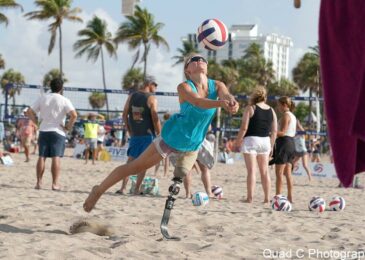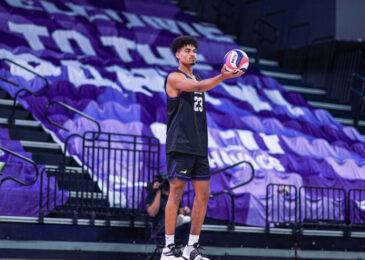Good nutrition plays a crucial role in athletic development and performance. It’s not uncommon for athletes to want to shed a few pounds, but it’s essential to do so in a healthy way that doesn’t compromise energy levels and effectiveness on the court. In this article, we will explore safe and constructive options for athletes looking to achieve their weight loss goals while maintaining peak performance.
- U.S. Men’s National Team Victorious in Volleyball Nations League (VNL) Week 2 Opener Against Serbia
- U.S. Women’s Team Shows Incredible Comeback to Defeat Turkey in VNL Final 6
- The Journey of the U.S. Men’s National Volleyball Team: Overcoming Challenges and Striving for Success
- Bay to Bay 17-1 Wins BJNC 17 Open
- By the Numbers: U.S. Women’s Open Tryout
The Importance of a Balanced Approach
Dr. Shawn Hueglin, senior sports dietitian for the United States Olympic and Paralympic Committee (USOPC), emphasizes the significance of starting a conversation with coaches and parents about nutrition. Creating an environment that supports healthy choices is vital, and athletes can also seek guidance from athletic trainers and dietitians when available. For those without access to specialized professionals, speaking to a strength coach can provide valuable insights and recommendations for small dietary adjustments.
Bạn đang xem: Getting Real: Achieving Optimal Nutrition for Athletic Performance
Hueglin directs athletes, coaches, and parents to the Team USA website, a comprehensive resource that offers information on various topics such as food types, eating guidelines, sport nutrition, weight loss, and overall well-being.
Count on Carbs for Fuel
While post-workout meals often prioritize protein, it’s crucial not to neglect carbohydrates, as they provide essential fuel for athletes. Adam Ross, campus dietitian at Division I St. John’s University, emphasizes the importance of healthy carbohydrates in fueling athletes. Foods such as sweet potatoes, quinoa, lentils, rice, beans, and fruit are excellent sources of healthy carbs for volleyball athletes.
Xem thêm : FIVB World Tour: Exciting Grand Finale in Brazil
St. John’s University offers a fueling station stocked with protein shakes, water, simple carbohydrates like pretzels and crackers, granola bars, and protein bars. While high school student-athletes may not have access to such facilities, packing water and protein bars can help them avoid unhealthy vending machine snacks.
The Power of Quality Protein
Quality protein plays a crucial role in energy and recovery. While some people choose to avoid red meat, Ross recommends incorporating it into the diet twice a week. Lean sources of red meat, such as those low in fat content, offer important nutrients such as iron, zinc, and B vitamins that aid in energy conversion, immune defense, and oxygen transport within the body.
Strive for Balance
Ross promotes a balanced approach to nutrition to enhance recovery and overall well-being. Nutrient-dense foods are a key component of this approach, and some examples include mixed nuts, avocado, olive oil, and brightly colored vegetables. Remember, the more variety of colors you introduce into your diet, the more vitamins and minerals you will consume.
Leave Fad Diets Behind
While fad diets might promise quick weight loss, they are generally counterproductive for athletes. One particular popular trend, intermittent fasting, can be detrimental to an athlete’s performance and ability to recover. Collegiate athletes often engage in weight training, attend classes, and have practice sessions throughout the day, making it important to fuel their bodies adequately.
Xem thêm : U.S. Earns Five Medals Across Two NORCECA Events
There is no quick fix for weight loss, and it is essential to approach it with a long-term perspective. A helpful first step is to maintain a food journal and track what you eat throughout the week. This will provide valuable insights into your nutrient intake and areas that can be improved.
Embrace Healthy Changes
When it comes to making changes to your diet, focus on small changes that can have a significant impact. For example, cutting out sugary drinks and reducing processed foods can lead to noticeable improvements in body composition and performance. The goal is not to eat less but to prioritize higher quality foods that nourish your body.
FAQs
Q: How can I achieve weight loss without compromising my athletic performance?
A: It’s important to prioritize a balanced approach to nutrition and seek guidance from professionals or coaches. Focus on eating healthy carbohydrates for fuel and consuming quality proteins. Strive for a variety of nutrient-dense foods, and avoid fad diets that promise quick results.
Q: Are fad diets effective for athletes?
A: No, fad diets are generally counterproductive for athletes. They can compromise performance and hinder the body’s ability to recover. It’s important to approach weight loss with a long-term perspective and focus on healthy, sustainable changes.
Conclusion
Achieving optimal nutrition for athletic performance involves making informed choices and prioritizing a balanced approach. By incorporating healthy carbohydrates, quality protein, and nutrient-dense foods into your diet, you can fuel your body effectively and support both performance and recovery. Remember, there are no quick fixes when it comes to weight loss, but small changes can lead to significant improvements. Stay committed to your goals, and consult with professionals or coaches for personalized guidance on your journey towards peak performance.
To learn more about achieving optimal nutrition for athletic performance, visit Alpinetgheep.
Nguồn: https://www.alpinetgheep.com
Danh mục: Volleyball



